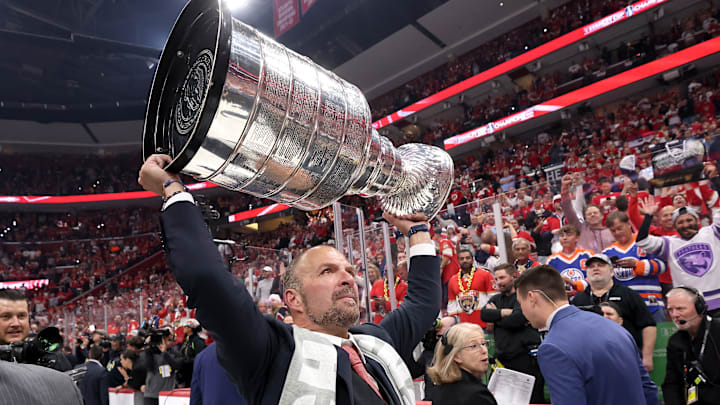Every year one of Dallas, Vegas, Florida, or Tampa are in the conference finals, journalists across the map say we have to talk about the fact they play in no-income-tax states. So let's talk about it. Yes, there are some advantages for people who live in these cities and states from a tax standpoint, but we're simplifying this a little too much.
Other taxes and cost-of-living expenses can make up for the lack of income taxes. Florida, for example, has slightly below average property taxes, but their rental prices are through the roof. Miami-Fort Lauderdale has the 10th highest average rental prices at just over $2,500 per month. The analysis from Construction Coverage combined Newark and New York City, but that rent is just $100 more, and it, again, includes New York City.
Rents are pretty cheap in Las Vegas if you're away from the Strip, but it's harder to live close to where you practice and play. While travel costs don't actually come into play when one thinks of salary, the commute does. Many players live in Summerlin, which is about 30 minutes away with traffic. It's a little more in high-traffic times than Hoboken (a popular destinations for the Devils players) to the Prudential Center.
The best example as to why this conversation is overblown is the Devils. Just look at the Timo Meier negotiatoins. Yes, he was coming from San Jose, California, but he had to understand the tax complications that come with New Jersey. Don't forget, he could have signed his $10 million qualifying offer and walked to unrestricted free agency. Instead, Tom Fitzgerald convinced him to sign an eight-year deal worth less than $9 million per season.
He did the same with Jack Hughes and Jesper Bratt. While they didn't have the qualifying offer situation Meier had, it's still impressive that Fitzgerald signed them both to eight-year deals at below market value. If Hughes signed for three or five-year deals like Auston Matthews, he would have made so much more money.
And that brings us to the point: this comes down to good and bad general managers. The Stars (Jim Nill), Golden Knights (Kelly McCrimmon), Lightning (Julian Breisbrois), and Panthers (Bill Zito) have the four greatest GMs in hockey. There really aren't other GMs in their conversation. They are dominating the sport. They are doing it with incredible negotiations, smart risk taking, and great drafting.
Many will point to Steven Stamkos signing for less a decade ago, Sam Reinhart signing for under $10 million, and a player like Esa Lindell signing for under $6 million in Dallas as examples of the no-tax state taking effect, but these are just good negotiations. Just like Hughes taking an $8 million payday, a good GM can get his internal players to sign on the dotted line.
There are other examples of these teams paying at or above market value for unrestricted free agents. Sergei Bobrovsky is still one of the highest paid goalies in the league at $10 million per season. The Stars needed to give Tyler Seguin close to $10 million per season to sign long term. Let's not pretend that $12 million is a pay cut for Mikko Rantanen. We're sure he wanted $13+ million, BUT THAT'S HOW NEGOTIATIONS WORK.
Because you saw something in a report about his negotiation tactics does no mean that's what it would cost to sign that player. Teams will save as much money as they possibly can, just to make life easier on their salary cap
The salary cap should not be impacted by a state's income tax in the NHL
People love to talk about this topic, but it's just not relevant. Cost of living is small on your priority level when you're 20-something years old and a millionaire. Plus, there are quite a few ways to lower your tax liability. They have some of the best accountants in the world, so they are getting the best bang for their buck.
On top of everything, there's the jock tax. Athletes have to pay taxes based on the city in which they practice and play. A California road trip is more than getting used to the time change and enjoying Disneyland, it's a tax burden. Players will pay different taxes in different cities, so the impact of their home team state tax is lessened in the process.
Taxes are complicated, and these players have agents and accountants to figure that out. Those agents will steer their player in the right direction, and Florida and Dallas aren't getting all the players simply because of taxes.
On top of that, outside of the Panthers, those teams are starting to get too close to the salary cap ceiling to make an impact in free agency or trades. The Stars, Golden Knights, and Lightning have about $20 million in cap space combined. The Panthers have closer to $20 themselves, but they might have to shell out a huge contract for Sam Bennett.
We haven't even talked about the exchange rate between the U.S. and Canadian dollar. As of this writing, every U.S. dollar is worth about $1.37 Canadian. Do we account for that when players on the Maple Leafs and Oilers get paid in American currency? All of their goods and services cost about 30% less than ours.
Let's talk about things in the NHL that we can actually make a difference with. Asking each team to have a different salary cap threshold is such a slippery slope. There's no reason to overthink this. Teams weren't jumping at the chance to sign with the Panthers 10 years ago. They are now because they are good. The reason they are good is because of Bill Zito, not Ron Desantis.
